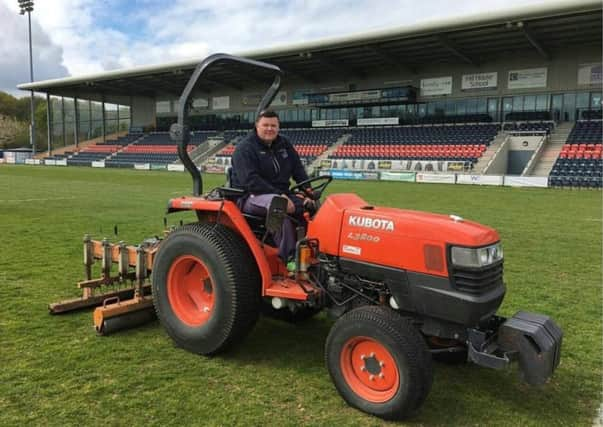Feature: Behind the scenes at Doncaster Knights with Castle Park groundsman Lee Blagden


“We are into February now and the pitch is still looking good in the areas where you traditionally get some wear and tear despite Doncaster Phoenix also playing on it,” said head groundsman Lee Blagden.
“Whereas with a traditional grass pitch the grass roots are just below the surface the roots on our pitch go into a synthetic matrix mat and that makes them much stronger and less prone to damage.
Advertisement
Hide AdAdvertisement
Hide Ad“Everyone loves playing on a well-grassed pitch at the start of the season and what the new pitch - which is 100 per cent natural grass – is designed to give you is a similar surface throughout the season even though you do lose some of the grass.
“Due to the fact that we open the pitch up with a machine called a procore, which goes down five inches, it helps to avoid compacting the soil and softens the blow when players are tackled and hit the ground hard.
“The work we do also helps players’ boots dig in a bit more and gives them a better footing. With the pitch also being level and having no ruts it should help reduce ankle and knee injuries.
“We’ve been lucky with the weather so far this winter. We’ve had the rain but because of the new drainage system, which is absolutely fantastic, the rain drains away very quickly and we’ve had no puddles or soft areas.”
Advertisement
Hide AdAdvertisement
Hide AdThis week’s weather, as was the case in late December, has posed different problems.
“Because it is 100 per cent grass you have exactly the same situation as with a traditional pitch if you’ve got frost,” said Lee.
“As we’ve done in recent years we cover the pitch with covers, which we’ve done this week, if frost is forecast.
“The covers we use will generally protect against frost down to around minus 5.
“We also use them if snow is forecast.”
Advertisement
Hide AdAdvertisement
Hide AdAlthough the end of the season is almost three months away, Lee and his team don’t intend to let the grass grow under their feet whilst doing just that.
“We are looking at doing an over-seed later this month at a time when the team haven’t got a home game which will probably take about two weeks to come through,” he said.
“We use a dimple seeder and that opens the ground up and lets you put a couple of seeds in and then it covers it to keep the birds away.
“We’ve already started to see some growth when we had a few warmer days towards the back end of last month.
Advertisement
Hide AdAdvertisement
Hide Ad“If I come across any areas showing wear during the winter months, and the weather is warm enough, then because of the new sprinkler system we’ve installed under the pitch we can put some new seed on the surface and it will germinate and grow.”
Although Lee and his staff are delighted with the way the pitch is looking, he says there is more work involved than with a traditional pitch.
“I would say there is double the work,” he claimed. “For a start you’ve got to make sure that the pitch is clean both after training and after matches.
“We’ve some mowers which are like a basic home mower and we go up and down and clear all the debris (old grass, mud) off the pitch so all the root base and leaf is all clean.
Advertisement
Hide AdAdvertisement
Hide Ad“With it being a sand-based pitch you’ve got to try and keep your sand and plant clean.”
Lee and his staff are also charged with the upkeep of the five other pitches on the Castle Park site used by the junior section and the various senior teams below Championship and Midlands Premier level.
Knights also train on the outside pitches during the week in addition to two 40-minute sessions on the main pitch (weather permitting) and the weekly captain’s run on a Friday.
Doncaster RLFC have also used the facilities, though not the first team pitch, during the last couple of months for pre-season training.